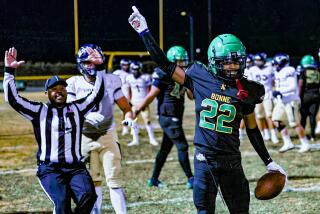This Time, USC Is Hit by Pac-10: 2-Year Penalty
- Share via
USC’s football program, which just recently finished serving severe sanctions for violations of NCAA rules, has been penalized to a lesser degree by the Pacific 10 Conference.
Thomas C. Hansen, conference commissioner, announced Tuesday that, because of 30 violations of NCAA rules that included improper recruiting inducements and improper control of complimentary tickets provided for players, USC would be forced to give up seven football scholarships in the next two years. The Trojans were ordered to forfeit four scholarships for the 1986-’87 season and three for the following season under a two-year probationary status.
Also, as part of the action against USC, the school will not be allowed to fill the spot vacated by Russ Purnell, an assistant coach, until July 1, 1986.
Purnell, the tight end coach, was fired by USC after it became known that he made an illegal number of contacts with recruit Dan Quinn, a linebacker from San Dieguito High in Encinitas. Quinn and his mother, Joan, informed the Pac-10 of Purnell’s violations. That reportedly triggered the conference investigation of USC. Quinn, instead of attending USC as planned, went to Notre Dame, where he was a freshman linebacker this fall. Hansen confirmed Tuesday night that the Quinn case was central in the “improper recruiting inducements” violation.
“Our intent with the Purnell situation,” Hansen said, “was to short USC one man in the area of recruiting this spring.”
Hansen would not comment on the specifics of “improper control of complimentary tickets provided for players,” but he said: “Student athletes are permitted four complimentary tickets per game. In some cases at SC, more than four were being given out.”
Hansen said that this was more “sloppy” than anything else and did not approach the severity of the Marv Goux case, in which the then USC assistant was the central figure in NCAA sanctions against the school for cash sales of player tickets. That was one of the violations that ended up in the severe NCAA penalties--two years of television and bowl-game bans and three years of probationary status. That was handed down by the NCAA in 1982, and the school just completed the final stage of that when it was kept off of live TV for the 1985 regular season.
“The reason for the two year’s probation this time,” Hansen said, “was prompted by the fact that USC was already on probation when the new violations came to light.”
The Times had speculated in a Nov. 13 story that USC would be assessed between four and six scholarships over a two-year period and would receive a one-year probation over the Quinn incident.
Hansen said that Pac-10 probation means “that we are watching even more closely than normal and that this is a bit of a further black mark against the school’s football program.”
USC officials downplayed the conference sanctions.
“We’re disappointed that we lost those scholarships over the next two years,” Coach Ted Tollner said, “but we believe with hard work we can overcome any significant effect on our program.”
Athletic Director Mike McGee said: “With the preventive program we have already put in place here and the vigilence by everybody involved, there’s no reason to anticipate any further problems of this nature at USC.”
Hansen said that the Pac-10 sanctions will be detailed in a report to the NCAA and added that, in the past, the NCAA has “regarded the job we do on these things with respect and has supported our decisions.” But he also added: “My expectations normally would be that the NCAA will do no more, but with the climate of things these days and the general tone of stiffening and tightening of penalties, I’m not sure what they will do.”
Arizona State’s basketball program also received Pac-10 penalties Tuesday. The school was placed on a one-year probationary period, during which it will not be allowed to give new scholarships in the sport.
More to Read
Fight on! Are you a true Trojans fan?
Get our Times of Troy newsletter for USC insights, news and much more.
You may occasionally receive promotional content from the Los Angeles Times.







